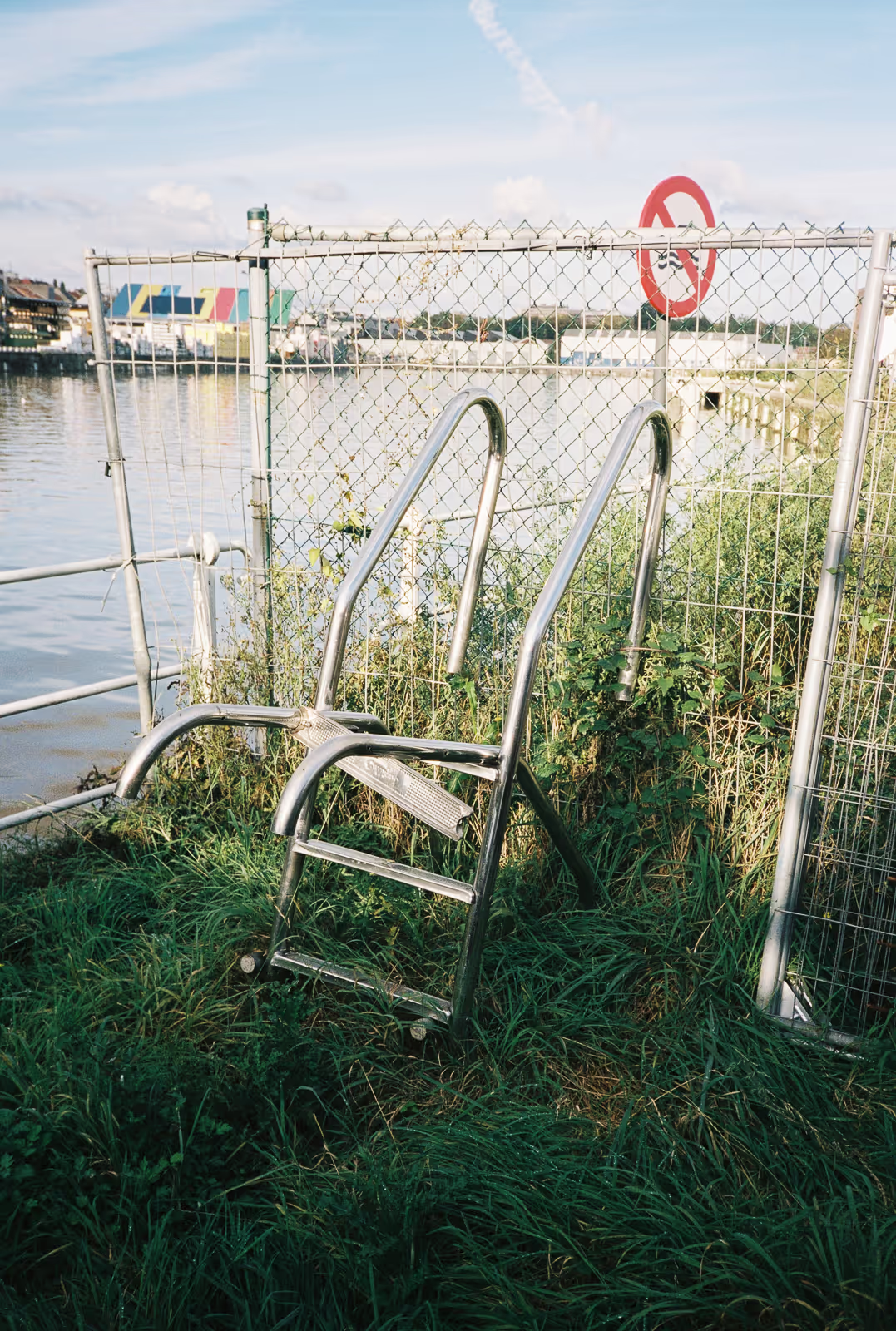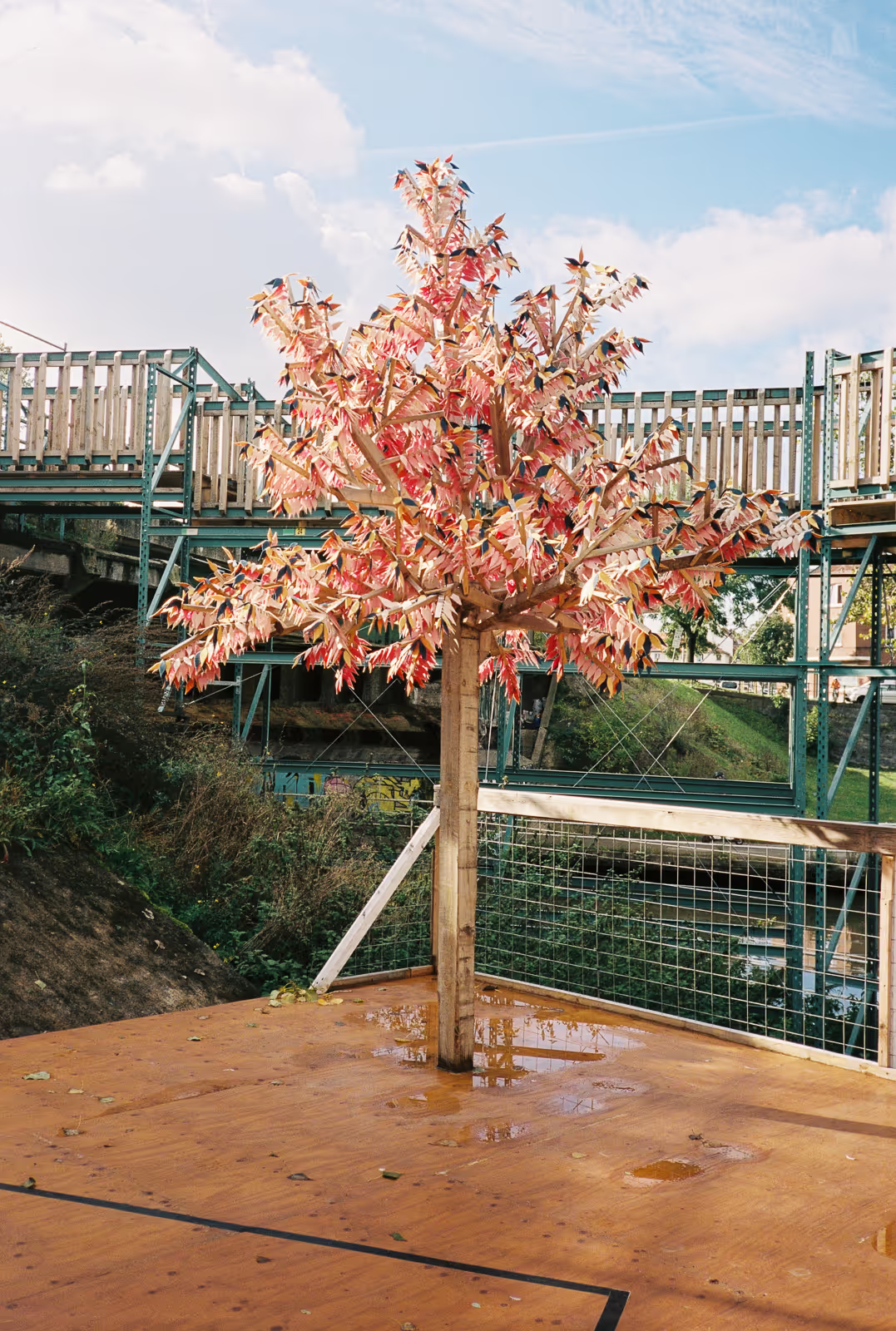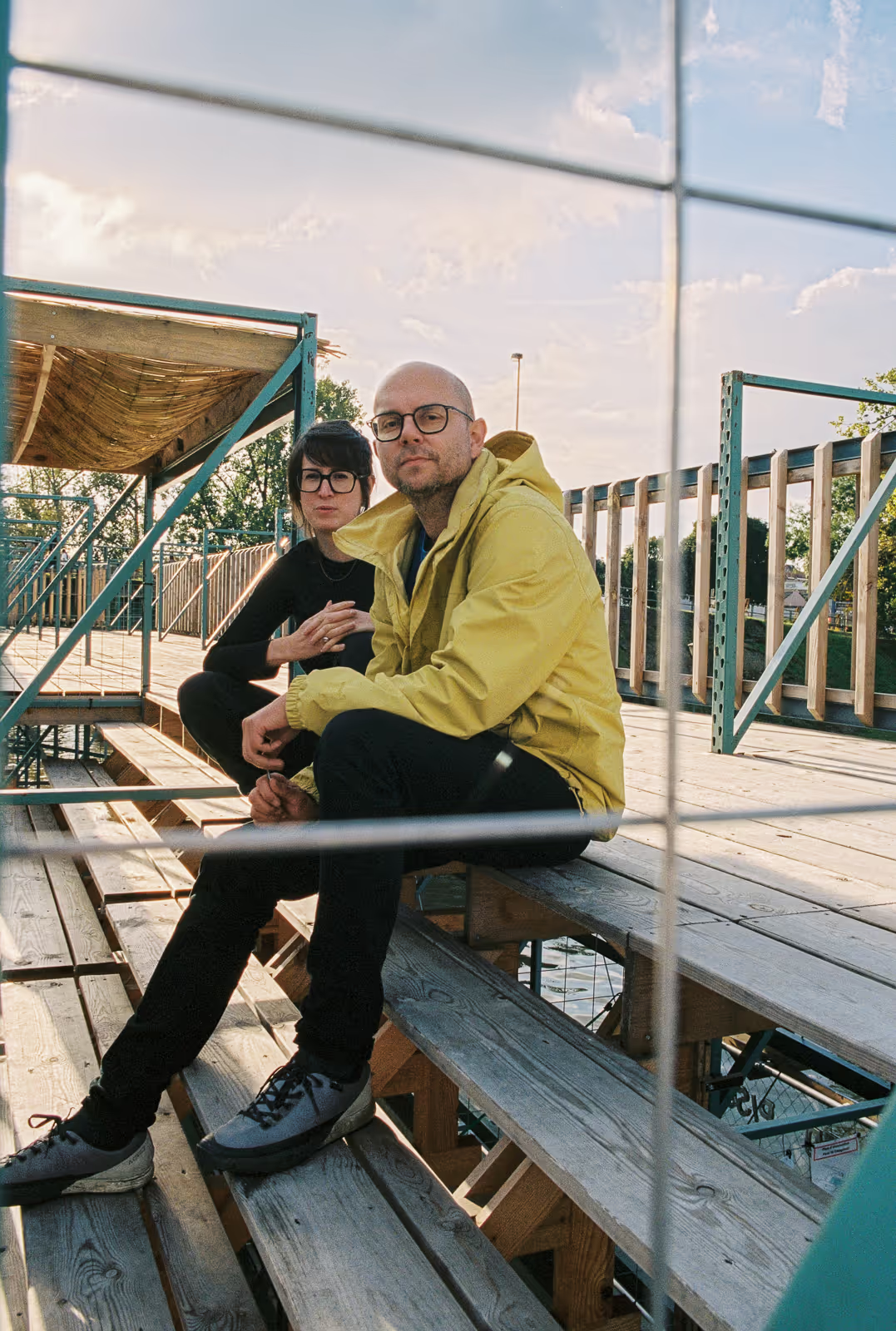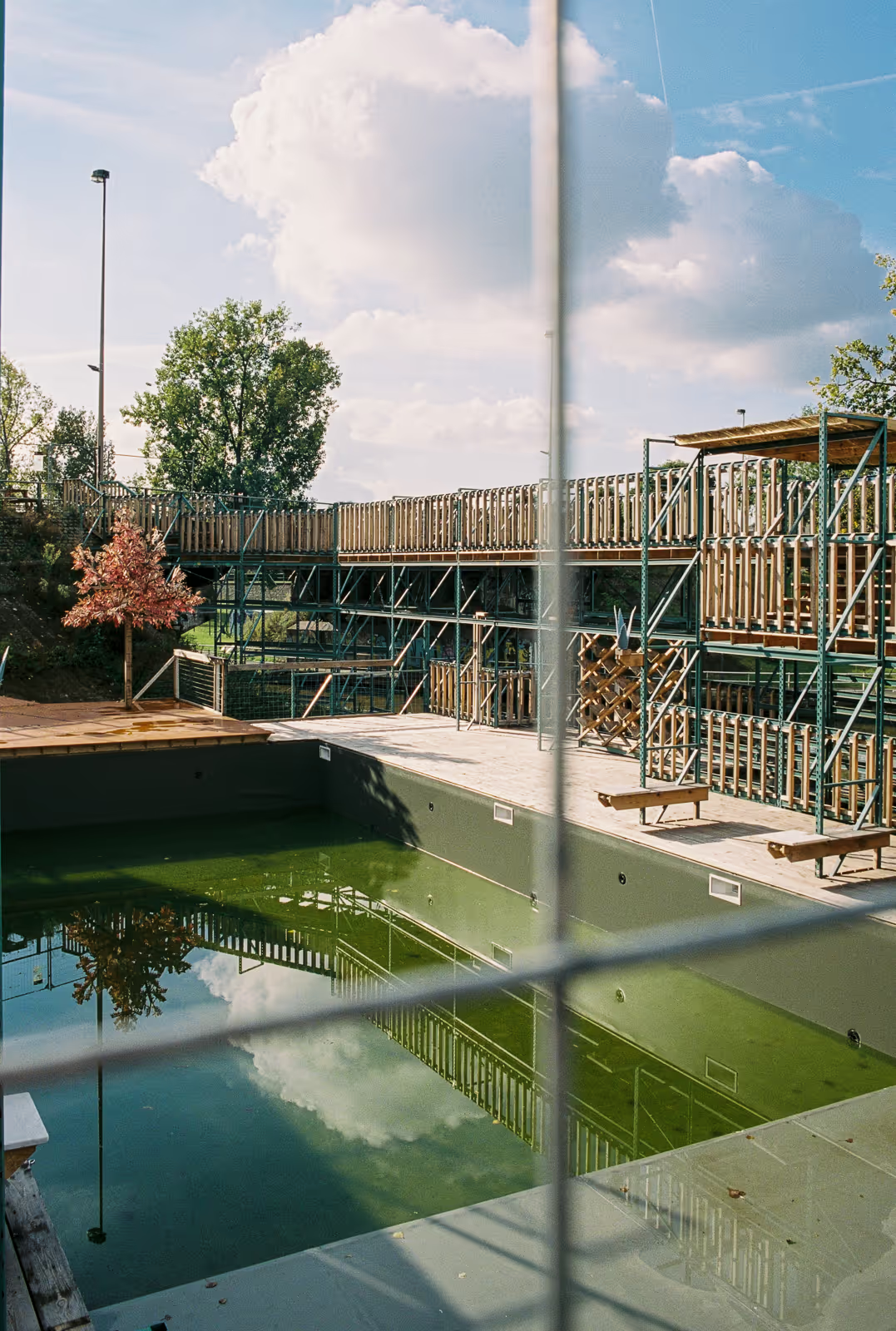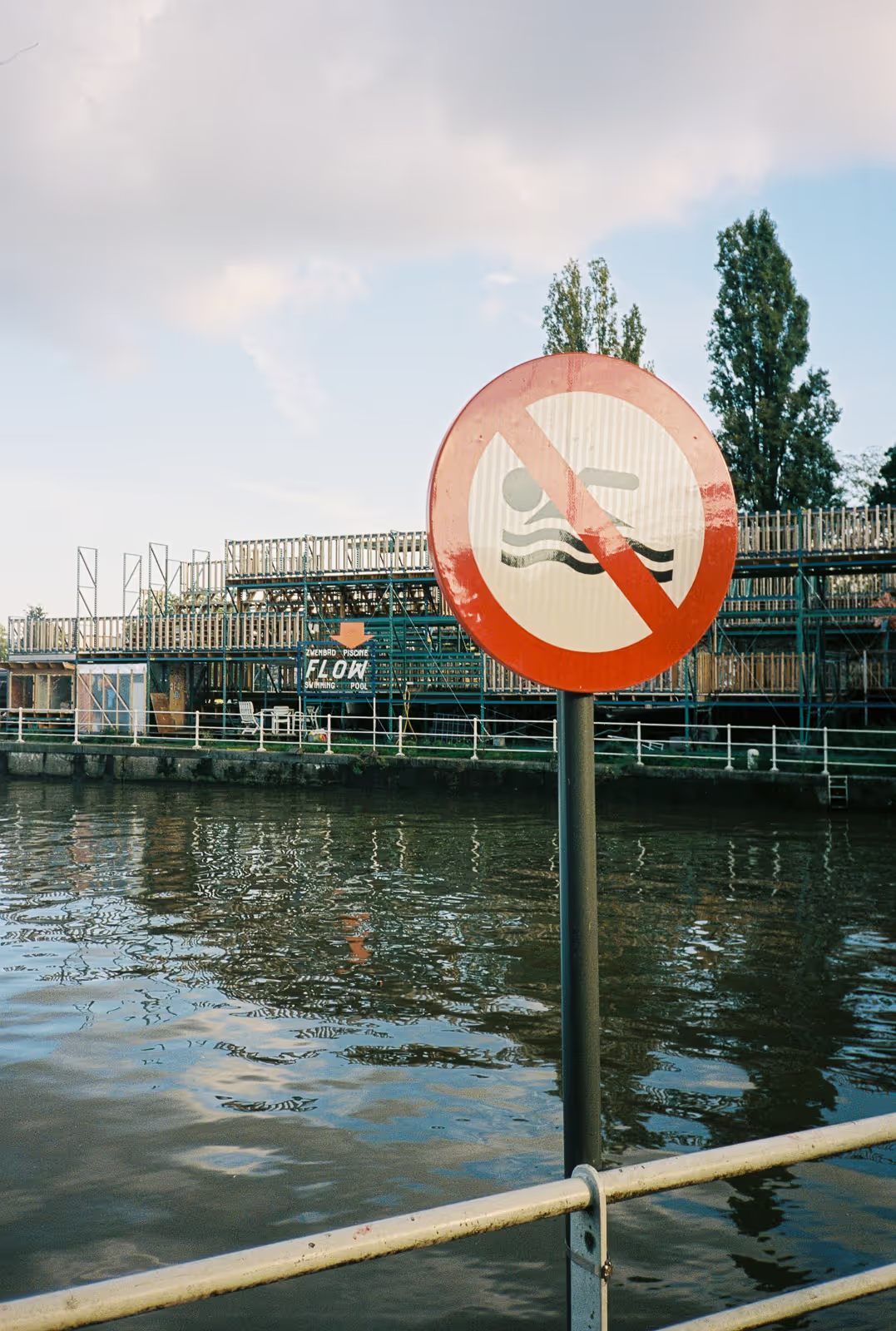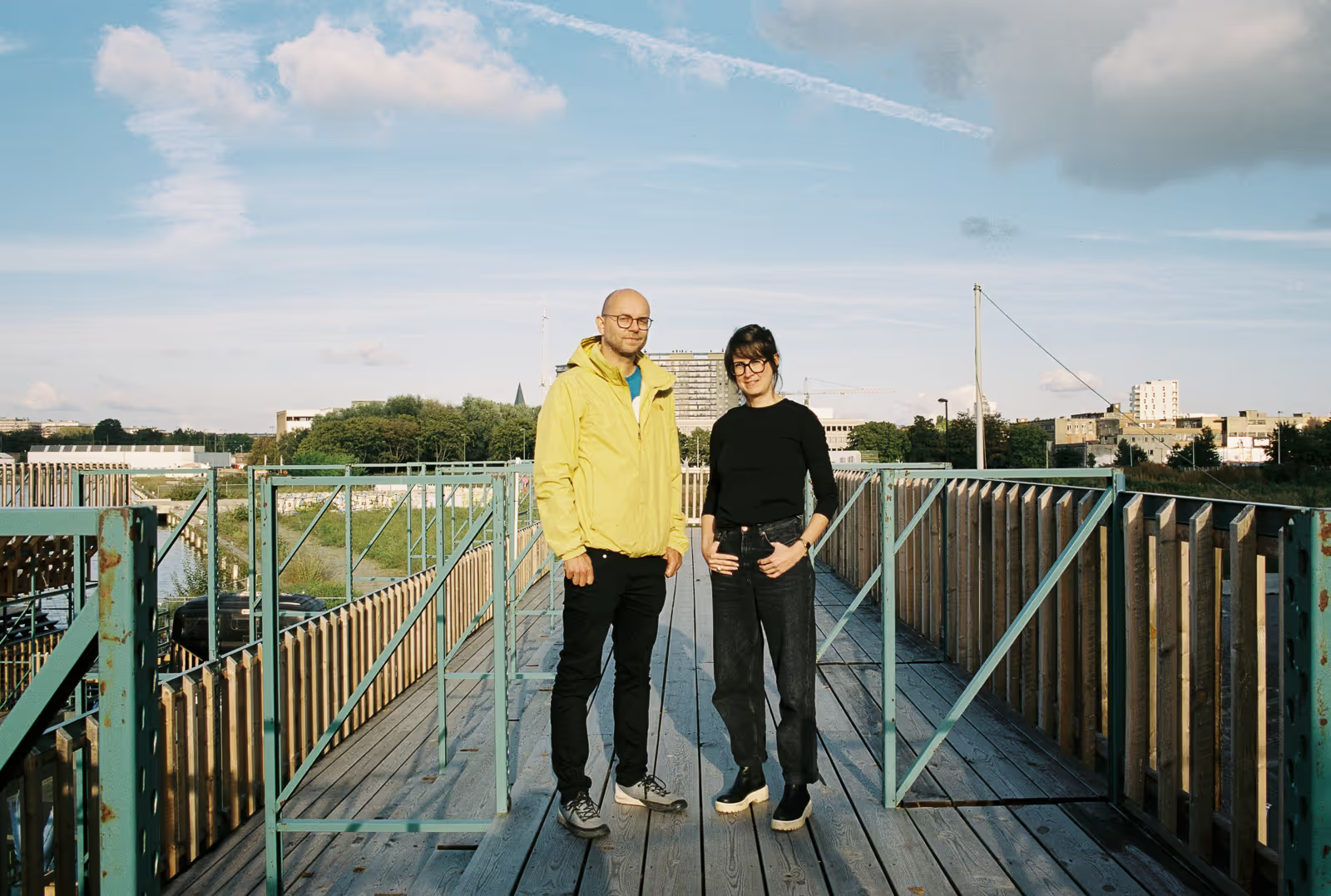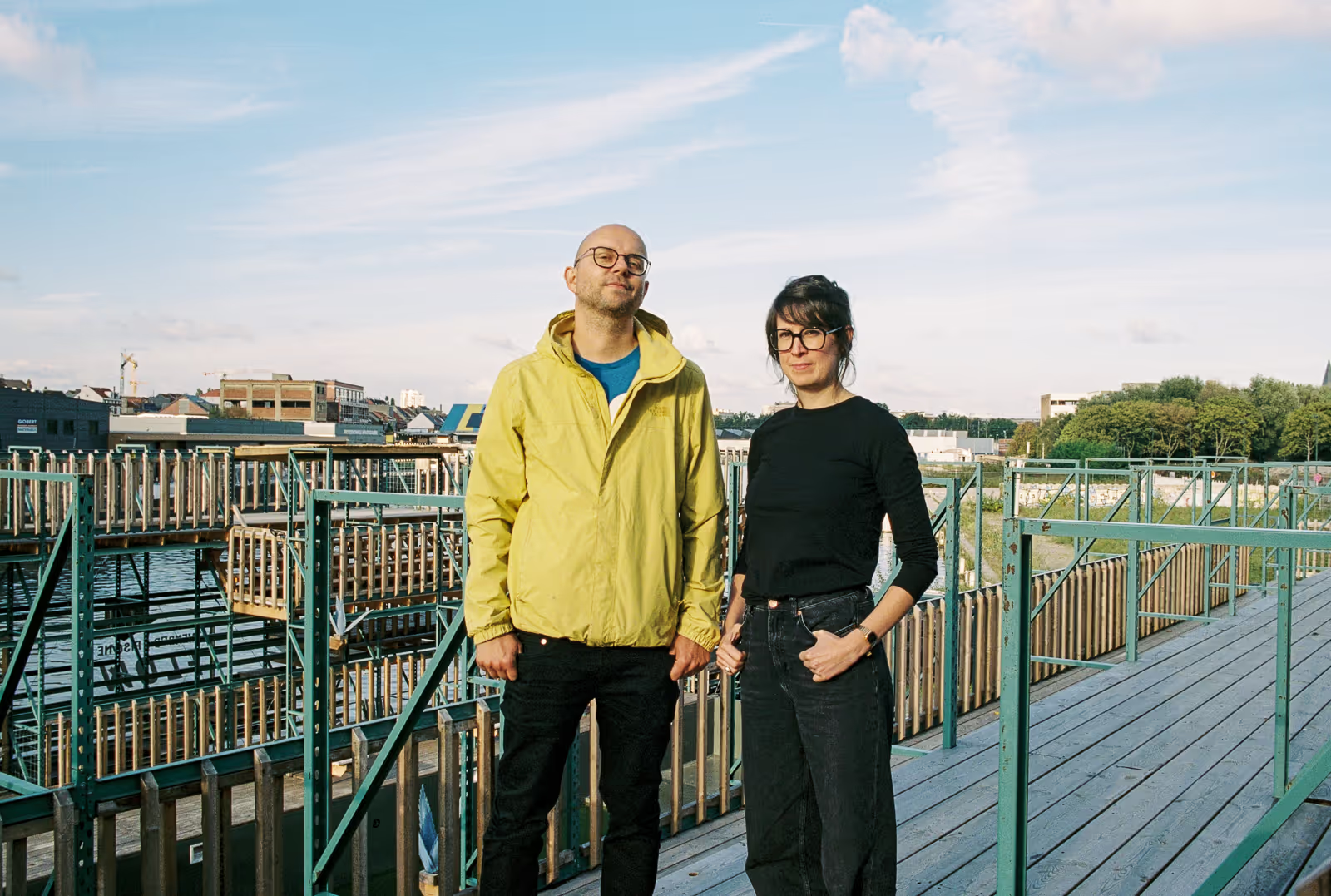





Interview by Blurbs
Photo by Lukas Turcksin
Keytrade and Horst share DIY entrepreneurship as a common denominator. With ‘Their Way’ they inspire their shared philosophy through a content series. ‘Their Way’ offers the stories of DIY entrepreneurs at the forefront of art, architecture and music. We delve into the messy, yet inspiring and insightful process of entrepreneurship. We celebrate and feature compelling stories, challenging initiatives and examples of integrity from around the world.
This month, we interviewed Paul Steinbrück and Louisa Vermoere from POOL IS COOL, an independent citizen’s group whose aim is to re-introduce outdoor swimming to the city of Brussels. We met up on an early autumn day at FLOW in Anderlecht, their first outdoor public pool which had just padlocked its gates after a roaringly successful opening season.
Horst: POOL IS COOL is a wide-reaching platform that brings together researchers, designers, swimmers, and citizens. Can you please tell how it all began, and who makes up the core team of the project?
Paul: Well, the beginning and the current core team are not necessarily linked since we’ve been around for six years already! But Louisa and I are two of the co-founders. We met in summer 2014: Louisa was organizing activities in the public space, and so was I. But we weren’t aware of each other’s practices.
Louisa: We had friends in common, and were eventually brought together via some Facebook comments discussing the arts, and debating (or ranting about!) the fact that there’s nowhere to swim in Brussels. Then we met up over a pizza and my partner, Andrea Sollazzo suggested the name POOL IS COOL as a joke, and it just stuck.
Paul: We didn't really know what we wanted to do at that point. We just knew that we could address the lack of open-air swimming in Brussels. Most of us are architects or urbanists. We have an idea how a city works, how city plans are made. So we thought, let's not just rant about it, let's do something.
{{images-1}}
Horst: Is this your full-time occupation or do you have other jobs teaching, research, architecture?
Paul: Now, it is. At least, for me! We started POOL IS COOL simply as a citizen group without major intentions. While our goal wasn’t necessarily to make it into a job, we slowly grew towards full-time employment. Once the projects got to a certain size, it wasn’t possible to manage them without going full time. I was the first person for whom it became my main occupation in 2019 with the Expedition Swim project, when we tested swimming in the ponds of Brussels. Now, especially with FLOW here in Anderlecht, we have between two and ten people working as coordinators or lifeguards for example.
Louisa: At the moment, we need a more permanent, continuous team. In order to open FLOW up again in May 2022 we have to get to work already!
Paul: We’ve transitioned from a structure based on volunteering to an organisation that hopefully will grow and gain a more stable working budget and continuous employment. That's the ambition.
"It's not about whether we want to build a pool, it’s more about swimming as an activity,and promoting the culture around it." - Paul Steinbrück
Horst: Speaking of ambition, what is the main mission and ambition of POOL IS COOL?
Paul: We define POOL IS COOL’s aim as reintroducing public, open-air swimming in Brussels. It's not about whether we want to build a pool, it’s more about swimming as an activity,and promoting the culture around it. How this can be materialised was never clearly defined, and it never will be because there are so many possibilities for swimming: in a pool, in a pond, in the canal, in something ephemeral, in something permanent.We will have reached our final goal when it becomes completely normal to say, "It's hot. I'm going to go swimming" and then 20 minutes later, you're in the water.
Louisa: In Brussels!
Paul: There should be enough swimming places for everyone, and they should all be accessible in terms of ticket prices. One pool won't be enough for Brussels.
Horst: Tell us a little more about the Brussels context. Why do you think all the options for swimming disappeared in the 1970s?
Paul: To be honest, we don't really know. The last open-air pool in Brussels closed in 1978. A lot of these infrastructures were private initiatives, so there's hardly any data to be found about them. By the '60s and '70s, these pool projects were already 30 or 40 years old.,and the technical infrastructure would have needed reinvestments. This combined with the shift towards more strict hygiene rules may have led to costs being too high to continue.
The public also became more independently mobile: in the '60s, '70s a great number of families invested in their own cars for example. Everything became privatized, and people were able to travel to the seaside or outside the city for a swim much easier than before.
What's remarkable is that there was no public outcry. If a pool was shut down today, there would suddenly be a group of people fighting to keep it open. That didn't happen back then. Maybe people just didn’t see the importance of public infrastructure.
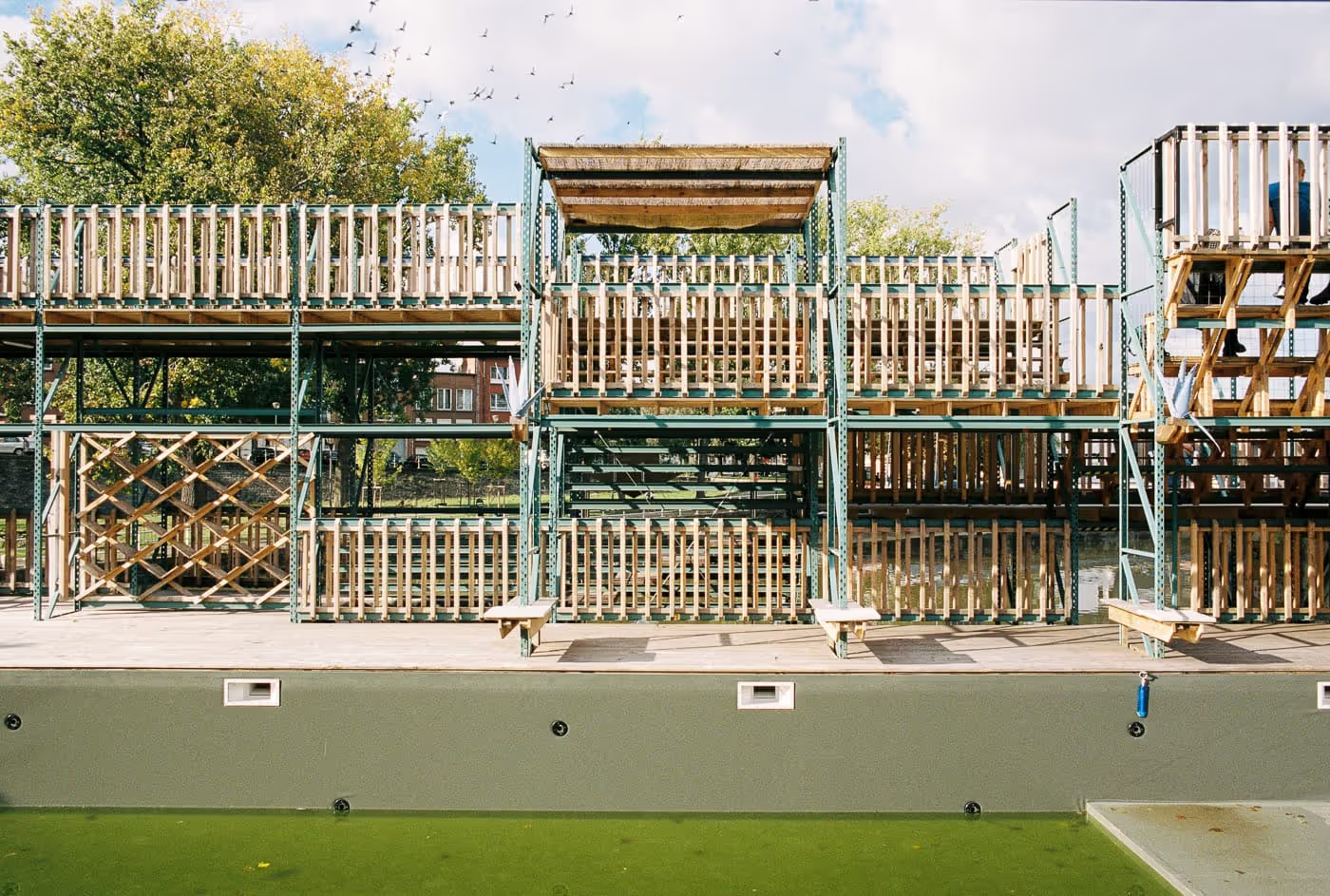
Horst: What are the organizations that you took inspiration from?
Paul: References of existing initiatives are one of our most important tools. We don't need to reinvent the wheel, there are so many fantastic projects we can learn from in order to find the right solutions for Brussels.
One of the first collectives we were in contact with is Laboratoire des Baignades Urbaines. They were jumping into the Bassin de la Villette in Paris in order to convince the city it was safe. They swam consistently and suddenly, they had 12,000 followers on Facebook and thousands of people diving with them. Eventually, they managed to get the city of Paris to build a swimming structure within the canal.
Another project is Flussbad Berlin. Their main discussion was not about making it possible, but what it means to swim naked next to one of the old museums or the new castle that was just rebuilt. They negotiate different urban functionalities between two cultures : “popular” swimming culture and “high” culture of museums.
We have a database of 170 reference projects, including Plus Pool in New York or Jubileumsparken, in Gothenburg, Sweden which taught us a lot about management, and we exchange with many individuals and organisations around the world like Timothy Sutton concerned with cold water swimming in London or Ooze from Rotterdam who link swimming to larger questions of water management.
"We never wanted to build pools. We wanted to make decision-takers, politicians, and administrations build the pools themselves."
— Paul Steinbrück
{{images-2}}
Horst: So, here we are at FLOW, the (free) outdoor pool in Anderlecht. Can you run us through how this project was developed
Paul: We asked for money. We got it. We built it!
Louisa: So easy!
Paul: Jokes aside, it was a long process. In late 2019 we were contacted by two alderwomen of Anderlecht, Elke Roex and Susanne Müller-Hübsch, to discuss what was possible in terms of outdoor swimming in their municipality. I thought we were talking about something that would happen 5 or 10 years from now. But no, they wanted something the following year! Then Corona struck, and the initial project got slated. Nobody knew what the future would bring. In the end, it gave us the chance to rethink and reuse what we had learned. The project as we saw it then was too naïve. The physical pool was thought through, but the framework that we needed to make it really happen wasn’t. Covid-19 gave us time and allowed us to rethink everything.
Horst: How did you then think about the pool in terms of being ecologically sound?
Paul: The current pool is a very classic one, with water circulating through filters, and chlorine added for disinfection. Initially, we had the ambition to use the water from the canal, and clean it with plants, but unfortunately Brussels’ legislation didn't allow it. Hopefully next year we’ll be able to achieve natural filtration, which uses much less energy, and can run all year round. Also, heating an outdoor pool with more than just the sun is one of the greatest needs for energy. We've proved that even without any additional heating and with a rather bad summer people will still come and enjoy the water at 18°C .
Horst: FLOW is your first pool. Will you expand and implant more pools across Brussels, across other cities?
Louisa: I wouldn't say FLOW is already the first pool, but a temporary project before the first pool is built that has allowed us to gain hands-on knowledge. We’ve not only learnt how to run a public outdoor pool here; but also how to achieve a very innovative structure that involves people from the neighbourhood. We’ve created a social and cultural structure that happens to also be a pool.
Paul: We never wanted to build pools. We wanted to make decision-takers, politicians, and administrations build the pools themselves. We want to push them by showing how necessary these infrastructures are for the public. In that sense, FLOW is not the first pool, but maybe the “zero pool”. It’s also only half the size of a normal one. FLOW is like a Trojan horse. It exposes people to outdoor swimming temporarily, but it can hopefully prevail in the long-term once the bridge and surrounding area are renovated.
Horst: As POOL IS COOL, do you aim to educate people about how they can reconnect with the water in the city?
Louisa: We hope that our practice can achieve something more than theoretical outreach, teaching, and preaching. This is a kind of practical example we are giving. Everyone’s goal is to bring about a change of attitude towards water itself. Some people think that water in the city is dangerous and disgusting. We want people to think, "Ah, wow, this is fun and full of life!"
Paul: For example,with Expedition Swim we went swimming in ponds, which was totally unimaginable for most people! We did water quality tests with the environmental agency of Brussels, and proved that the water is good enough to swim in, with no health risk at all. Despite the test, some people were a bit disgusted by the mud, but the kids who came loved it. They were piling mud onto their heads and rubbing it in their hair!
Louisa: Very down to earth, literally.
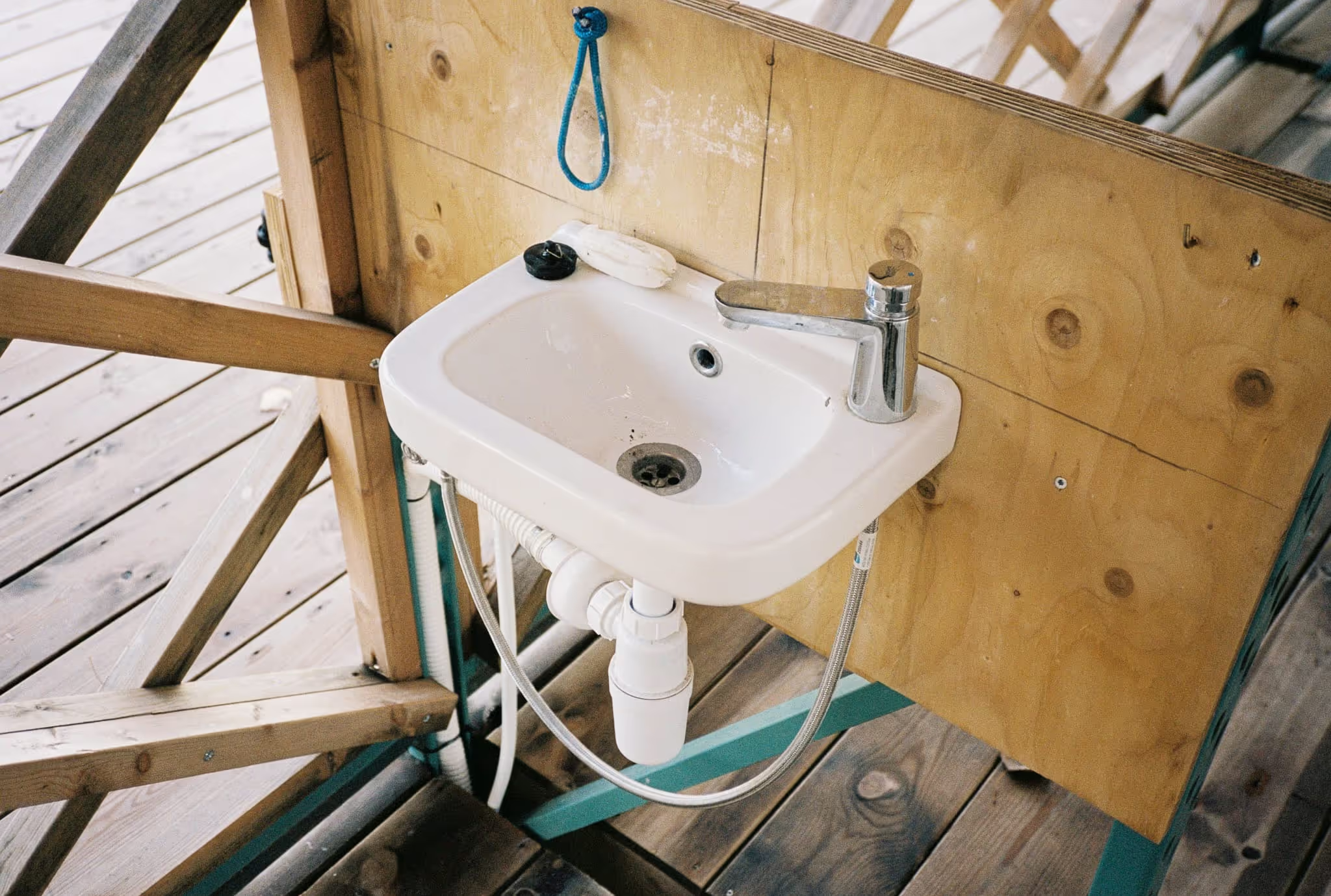
Horst: There was a historical moment in European cities where rivers and canals were covered up with concrete, like the river Senne in Brussels.
Paul: That wasn’t really linked to any ideas of using water for recreation or not, but back then in the 1800s those waterways were the city’s sewage system. Waste went directly into the rivers, so they were covered up to hide that. But now there are initiatives to uncover them again.
Louisa: Yes, for example, in Ghent where I come from, they have uncovered the river, which has led to the creation of a beautiful park with streams. It has become very livable for families with kids. However this brings gentrification and the area is now absolutely unaccessible for people with lower incomes. What was one of the poorest neighbourhoods has been opened up towards the water. But, by giving this new quality of life, property has tripled in price. We don’t think the answer is to refuse change or this kind of initiative, however what the city does to counter the fact that certain areas are becoming unaffordable for huge groups of people is really important.
"It was the local community who did the work in making it their own. They brought their families and told the neighbours about it."
— Paul Steinbrück
{{images-3}}
Horst: On that note, how did you guys think about this in terms of inclusivity and community-building for this project?
Paul: Inclusivity was one of our major concerns. How could we make this a project that is both an attraction for all people from Brussels and strongly anchored in the neighbourhood? This ambition was reflected in all parts of the project, whether it was designing, constructing, managing, programming, or communicating. It was the local community who did the work in making it their own. They brought their families and told the neighbours about it.
Louisa: In the beginning, before people saw the project, I was getting reactions like "What the hell is she talking about? An open-air pool in our neighbourhood? It can’t be for us!" It was too beautiful to be true! So the fact that people came and realised it was accessible and free, then spread the word really created a community. Every Friday we hosted activities run by Zinnema, a local cultural organization. They have a great network and programmed artists who in turn brought their crowd with them. They also held activities like tinkering workshops for kids or bike repairs on the bridge.
Thanks to the collaboration with Art2Work the pool was managed by a team of youngsters from Anderlecht and the surrounding area, which made FLOW something with them, not just for them.
We worked with Decoratelier and Jozef Wouters as designers and builders. They used scaffolding, which acts as a metaphor for the project: you can add parts, take parts away, it’s constantly changing, never finished. The modularity allowed for large parts of the structure to be prefabricated in Decoratelier’s workshop with more than 50 young people before the on-site building started.
"Bear in mind that you always need other people to work with you. The biggest step for us was realizing we couldn’t do everything by ourselves." - Louisa Vermoere
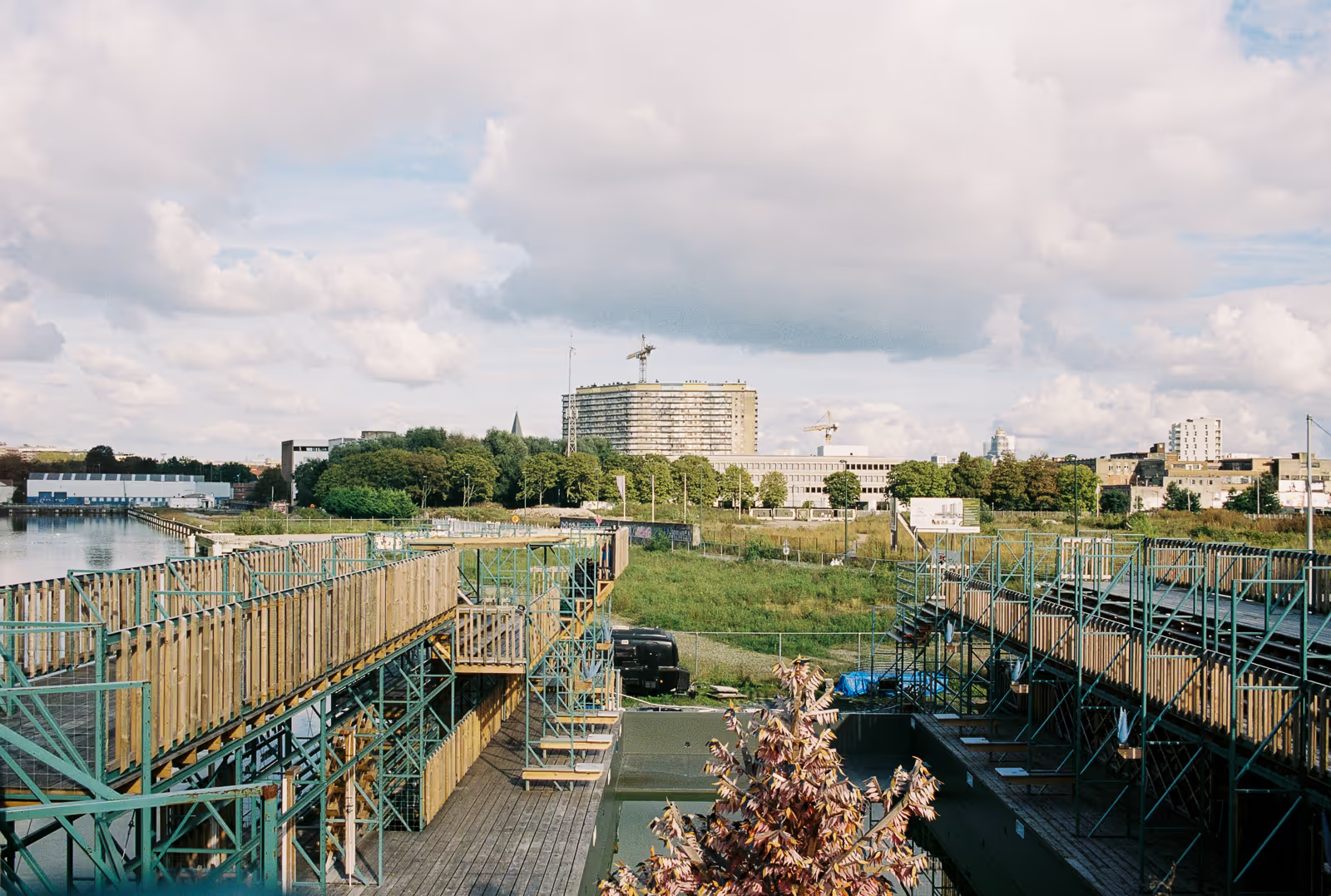
Horst: Could we say this is a testing ground for hybrid ways of collaborating, financing and organizing projects in general, not just pools?
Louisa: Normally, architects would be approached by a client asking them to design a pool. That’s not the case here: we are no longer just architects. We have taken, amongst others, the role of the client (which would normally be organisations or institutions, like Au Bord de l’eau or Bozar for example). In this instance we were the people who wanted a pool, looked for the money, implemented, and ran the pool. We also acted as researchers, architects, graphic designers, event organisers, and communicators.
Paul: We don’t know what the limit of such an approach is yet. The combination of a place that’s fun for recreation, is accessible to everyone, answers socio-cultural concerns in the neighborhood, and provides a responsible working place/employer for people is very interesting. This could be developed for other, similar infrastructures that—like pools—have a high running cost, but low revenues. To run a pool, you of course need people who can really coordinate everything, but what’s even more important are the people who have fun and talk with clients. You need heart, ambition, hospitality, and spirit to do this kind of project.
Horst: Do you have any advice for other social entrepreneurs?
Louisa: Please contact us! (laughs)
Bear in mind that you always need other people to work with you. The biggest step for us was realizing we couldn’t do everything by ourselves. There is absolutely no project you can do solo. In Brussels,people are sometimes doing the same things one kilometre from each other and have no idea. It's all about finding each other. It's not easy, but it's important.
Horst: Last question! Can you share a favorite moment from the summer at FLOW?
Paul: In the mornings, there was always one member of POOL IS COOL and one member of staff here to prepare the showers, and to do a final clean of the sanitary spaces. One day, we were done setting up a half an hour early, and it was a super quiet sunny morning. We just said, okay, let’s go swimming. It was a very nice, quiet swim in the sun. That was a nice memory.
Louisa: My favorite moment was when the Port of Brussels placed a sign that said that you cannot swim in the canal on the exact day that the swimming pool opened right next to the canal. I was like, "What? This is amazing." That was the craziest moment for me, an absolute coincidence. It was beautiful...
